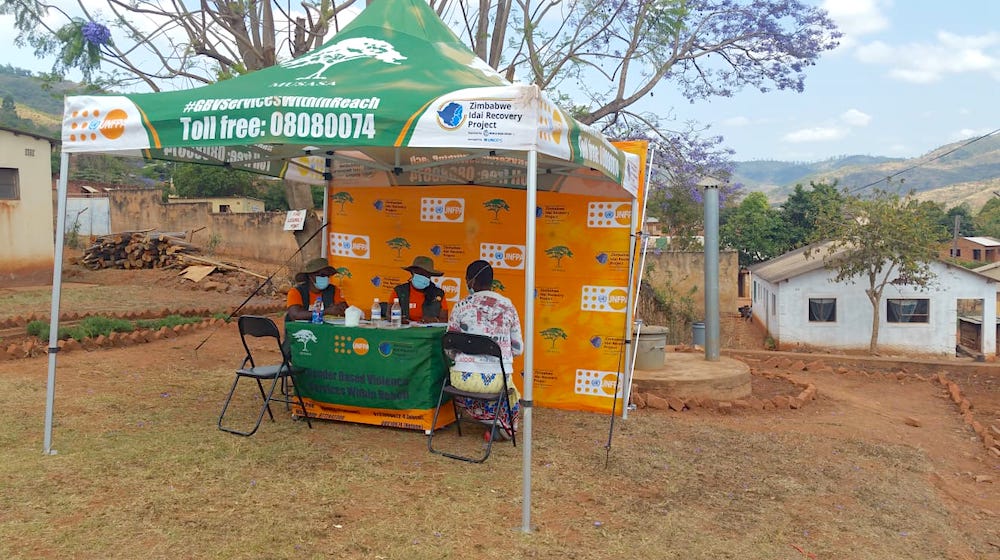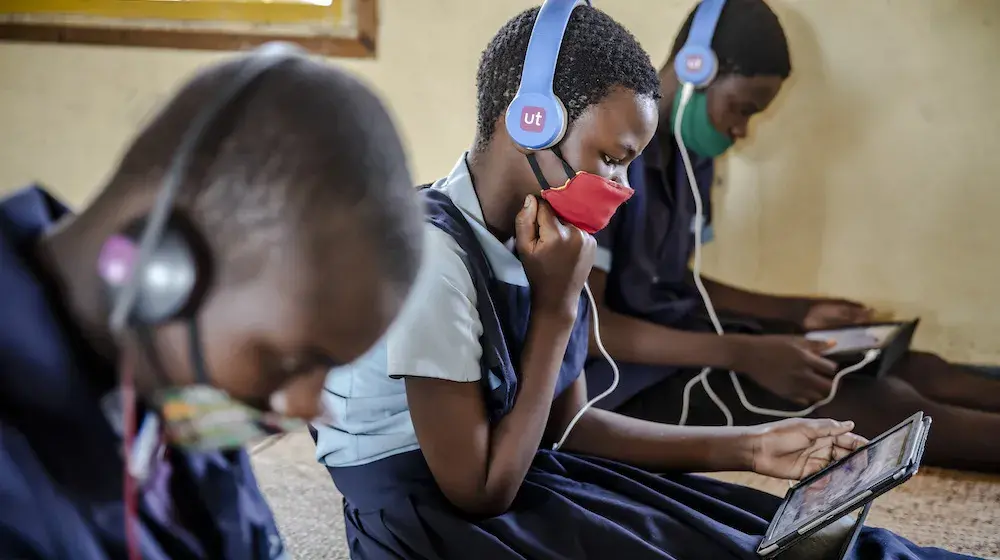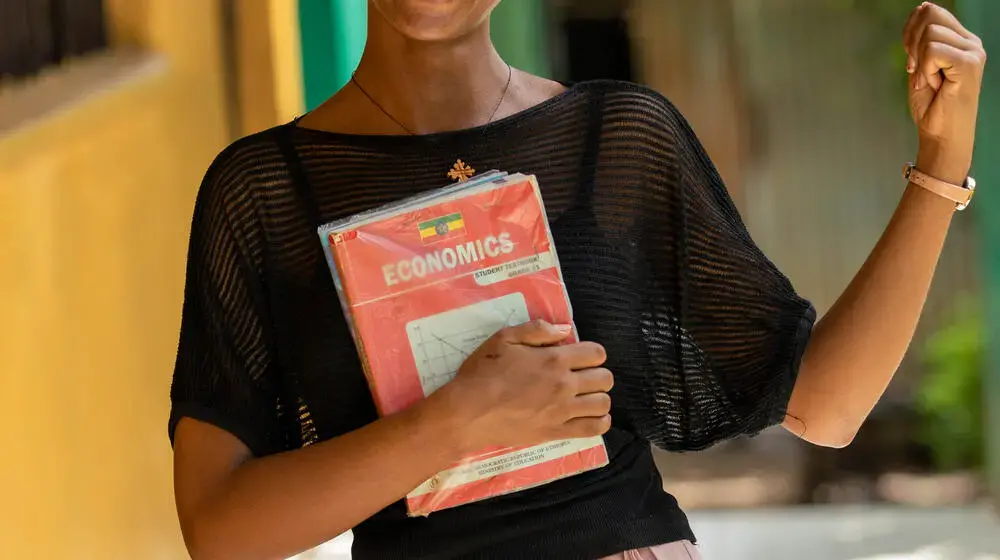HARARE, Zimbabwe—The World Bank has recognized UNFPA, the United Nations sexual and reproductive health agency, in Zimbabwe for innovative work in responding to and preventing gender-based violence in the cyclone-affected districts of Chipinge and Chimanimani.
This work has been implemented under the Zimbabwe Idai Recovery Project (ZIRP).
“In early project implementation, we noticed a need to enhance provision of relief and pathways for people affected by gender-based violence or sexual exploitation in the aftermath of the cyclone,” said Nicholas Callender, ZIRP co-Task Team Leader and Disaster Risk Management Specialist.
We are pleased with how this collaboration is assisting the community, particularly during this pandemic period, where incidences of GBV have been on the rise.
“We engaged with UNFPA based on their comparative advantage and knowledge in this area, and we are pleased with how this collaboration is assisting the community, particularly during this pandemic period, where incidences of GBV have been on the rise. We encourage communities to continue to access these services,” he said.
To date, more than 3000 GBV survivors have been reached while 38 rape survivors accessed post-exposure prophylaxis through the mobile OSCs, and 91 received post-rape care at selected health facilities. Almost 700 survivors were referred for services. More than 3170 dignity kits have been distributed to women and girls.
Helping communities recover from Cyclone Idai

Funded by the World Bank, ZIRP is a three-year programme responding to the devastation left by Cyclone Idai in March 2019. It supports recovery initiatives through resilience-building efforts in the worst affected areas.
ZIRP provides immediate support in the affected areas, while enabling medium-term cyclone recovery and resilience-building. It also provides project management and technical assistance through a multi-sectoral approach.
UNFPA joined the ZIRP team in July 2020 to ensure delivery of GBV essential services and GBV risk mitigation in Chimanimani and Chipinge. As there was an increased need for GBV risk mitigation and response, and to ensure continuation of GBV essential services in the ZIRP target districts, UNFPA support to essential service provision will continue until December 2022.
The programme is managed by the United Nations Office for Project Services (UNOPS) and implemented by agencies with expertise in food security and livelihoods, health, education, community infrastructure, migration, GBV risk mitigation and essential services provision. These include Food and Agriculture Organization (FAO), International Organization for Migration (IOM), United Nations Population Fund (UNFPA), United Nations Children’s Fund (UNICEF), UNOPS, World Food Programme (WFP) and World Health Organization (WHO).
Ensuring the well-being of the most vulnerable
“We appreciate the efforts being taken to ensure the well-being of the most vulnerable women and girls in Cyclone Idai recovery areas,” said Dr. Esther Muia, UNFPA Representative for Zimbabwe.
Under the ZIRP technical assistance component, UNFPA works to build resilient systems and structures, to avert and respond to GBV in the targeted areas. The agency plays a critical role in strengthening monitoring, referral and response to GBV, and increasing availability of services in response to GBV.
A key intervention is the delivery of GBV mobile services in remote and hard-to-reach areas, through the mobile One-Stop Centre (OSC). This is run by outreach teams made up of specialized counsellors and paralegal officers working in close coordination with nurses and police survivor-friendly units.
We appreciate the efforts being taken to ensure the well-being of the most vulnerable women and girls in Cyclone Idai recovery areas.
The provision of these services is integrated within the broader mobile clinics, led by WHO. UNFPA has trained mobile clinic medical staff on the clinical management of rape, to ensure the ongoing provision of timely services. The teams are trained to use a survivor-centred approach, which includes the principles of respect, confidentiality, privacy and non-discrimination.
As part of the programme, 13 health-care staff for the mobile clinics were trained on clinical management of rape, and 30 paramedical personnel were sensitized on GBV.
The integration of services with the mobile health clinics has enhanced GBV service uptake, as the mobile clinics function as an entry point for GBV survivors who might access the clinic for other reasons.
Comprehensive services under one roof
GBV survivors, both male and female, have embraced the model as the OSC offers a comprehensive package of expertise under one roof, and reaches those in hard-to-reach areas. The mobile OSC model has proved highly effective in enhancing service uptake in these areas, including during the COVID-19 lockdown.
Another key intervention under ZIRP is community-based GBV surveillance and referral strengthening through community health workers, known as behaviour change facilitators (BCFs), who are trained in integrated sexual and reproductive health and rights, together with HIV and GBV prevention. BCFs work closely with service providers to ensure timely referrals and access to life-saving services for survivors. Within ZIRP, they work closely with village health workers and agricultural extension workers to ensure that information on GBV referral pathways is included in awareness programmes.
The coordinated approach helps us in defining evolving GBV hotspots and to adapt the response in a survivor-centred manner.
BCFs were recognized as essential service providers during the COVID-19 lockdown, thanks to the joint efforts of the national GBV sub cluster, UNFPA and the Ministry of Women Affairs, Community, Small and Medium Enterprise Development. This enabled them to conduct GBV surveillance and facilitate the referral of GBV survivors to essential services.
UNFPA supports UN agencies involved in ZIRP with building awareness and capacities on GBV risk mitigation and referral pathways.
“The coordinated approach helps us in defining evolving GBV hotspots and to adapt the response in a survivor-centred manner, across food security, health, education, shelter and infrastructure sectors,” said Verena Bruno, UNFPA Technical Specialist on GBV.




